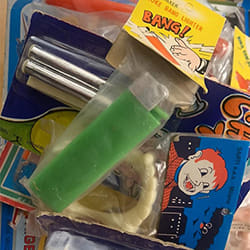Switching topics, have you shocked people from a foreign country because you eat something that seems repulsive to them? Japanese people, for example, tend to eat a lot of fermented foods. One of the most familiar is fermented soybeans, or natto. I love it, and will happily stuff it in my mouth without a single thought that it smells bad. I’ve never been put off by the slimy texture, either.
I’ve been way more shocked tasting blue cheese or other strong cheeses, but they have such a distinct flavor that even though I kept tasting them expecting to be shocked over and over, they eventually grew on me. But there is an Italian food that shocked me so completely that I still don’t have the courage to try it, and that is casu marzu. Everything about it—the look, the smell, the consistency—is extreme. Even the Italians themselves will admit it.

It is a creamy cheese infested with live maggots, which is scooped up with a knife, maggots squirming, and eaten.
This rare maggot cheese is most famous in Sardinia, an island known around the world for its endless beautiful beaches. And while you may expect that a place surrounded by the ocean would be famous for its traditional seafood cuisine, its signature dish is actually whole roasted piglet.

I’m always eager to try the traditional dishes whenever I travel to a new province, but understandably I had no interest in eating the casu marzu in Sardinia. I could not even bring myself to walk into a restaurant that had it on the menu. The whole roasted piglets I eventually got used to seeing since they had them on every street corner, but it would have probably taken forever for me to get used to seeing casu marzu, and I simply did not have the courage to actually put it in my mouth.
Cheese aficionados claim that the taste is out of this world, but there are some health concerns surrounding casu marzu that have actually resulted in it being banned from commercial markets. This rarely happens, but apparently there is a risk that the maggots you eat with the cheese will survive your stomach acid and travel into your colon and continue living there. It has therefore been dubbed the world’s most dangerous cheese. You even have to wear protective glasses when you eat it so the maggots don’t leap into your eyes when you attempt to scoop up the cheese. When I pressed further, I learned that it wasn’t just that they were squirming around in the cheese, but that they were able to somehow jump as well.
Still, it’s quite interesting how they actually make the cheese, so I recommend that you take a tour of a farmhouse where they’re doing it. To simplify, they let flies cover the cheese and lay their eggs on it. When the larvae hatch, they eat the cheese and secrete enzymes that accelerate the fermentation process until the cheese is matured to the point of decomposition. This creates a creamy texture that melts in your mouth.
Are you brave enough to try a bite of casu marzu?




























































